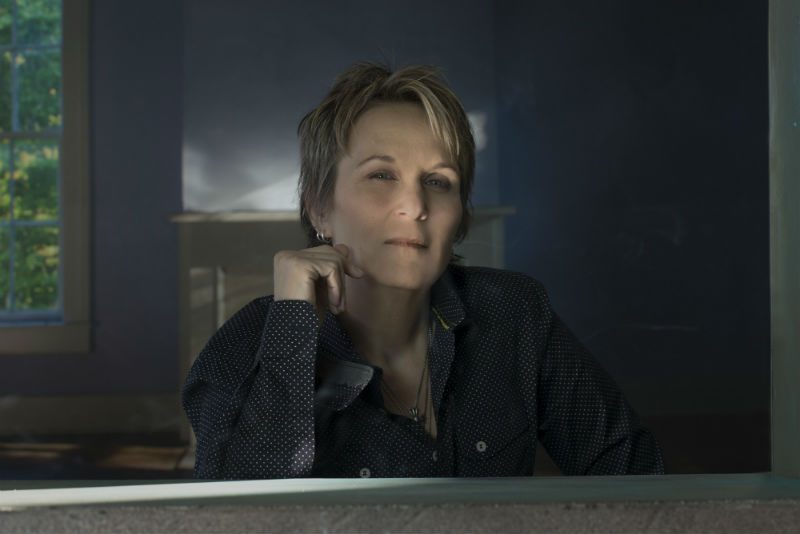Mary Gauthier is back, better than ever, with a masterpiece of love and loss.
No disrespect to Beyoncé but she is not a “survivor.” For all her good looks and soaring vocals—and she may well be a lovely person—Beyoncé is a pop star.
Mary Gauthier, on the other hand, is a survivor. Born in Louisiana and adopted shortly after her birth, Gauthier was a teenage runaway. She hung out with drug addicts and drag queens, moved around a lot, became addicted to alcohol and heroin, and, at a particularly low point, even wound up in jail. She didn’t write her first song until she was 35.
Since the late ’90s, over the course of seven studio albums, Gauthier has become one of the best songwriters of her generation. Her 2010 album, The Foundling, is a song cycle that deals with the pain of being abandoned as an infant, the unshakable sense of rootlessness that led her to search for her birth mother, and her birth mother’s decision to not have a relationship with her (chronicled in the disc’s harrowing centerpiece, “March 11, 1962”). The Foundling was one of the best albums of 2010, hands down. Does Gauthier equal the lofty songwriting of that album on her new album, Trouble and Love? Remarkably, yes.
This record is similar to The Foundling in a couple of ways: first, in that it too is a song cycle of sorts, and second, in that it deals with a loss. But rather than exploring issues of family, Gauthier turns her gaze to matters of the heart this time around. There are only eight songs on Trouble and Love. Gauthier—who coproduced the disc in Nashville with Patrick Granado—explains, “I [originally] wrote 35 or 36 songs and it turns out that the eight that are on it are exactly what I needed to tell this story. These are the ones that are the best and that tell the story in a chronological way.”
Gauthier is not one for small talk either; she cuts through the preliminaries and gets right down to business on Trouble and Love. The opening track, “When a Woman Goes Cold,” is probably one of the most powerful songs she’s ever written. Anyone who has lived through that moment when your partner—specifically your female partner—shuts down and turns into a stranger before your eyes will relate to these lyrics. “It’s not a voluntary thing,” says Gauthier. “There’s something in the DNA that shuts a woman down. And she’s gone! It’s not a choice anymore. She might wanna come back, and she cannot.
“I’ve gone through it more than once,” she continues. “I’ve actually been that person [who goes cold] as well. So I’ve been on both sides of it. And having been alive for a while, I know that it’s not a unique situation to me—that it happens to people. I didn’t realize how much it happens to people until I started playing the song out, and women came rushing to me. I thought I wrote a dude’s song, really. I thought I wrote one of those lesbian songs that men can go, ‘Oh, fuck yeah!’…But one of the things that this song has done is that it explains this as a phenomenon—a universal human phenomenon. So that when it’s happened to someone and they don’t know what the fuck just hit ’em, they can say, ‘Well, she’s gone cold. Look, there’s this song!’ It puts it into a context, so it’s not so personal.”
From there, Trouble and Love continues through the aching title track to the old-timey blues of “Oh Soul” to what may be my favorite song on the album, “How You Learn to Live Alone.” With a deceptively simple melody and lyric, Gauthier manages to convey the incredible sadness and resignation that accompany the aftershock of being left. Of the tune, which has been featured on the TV series Nashville, Gauthier says, “In this song, there’s an acceptance. I’m not fighting it anymore. You know, the final stage of grief is acceptance. And once you get to acceptance, there’s peace, there’s healing, and there’s also gonna be love again…So, with this song, the record takes a turn.”
The final song on the album, “Another Train,” takes it a step further. To her credit, though she goes deep into the darkness, Gauthier doesn’t point fingers, and she ends Trouble and Love by letting in some light. “The last line of the record is, ‘There’s gonna be another train.’ You know, I’ll find my way back to love…This was a mighty, mighty blow. It brought me to my knees and I stayed there for quite a while,” she laughs. “But it didn’t kill me. I’m standing back up, and I’m getting to the station, and there will be another train. Human resilience is a thing to behold.” The words of a survivor.
